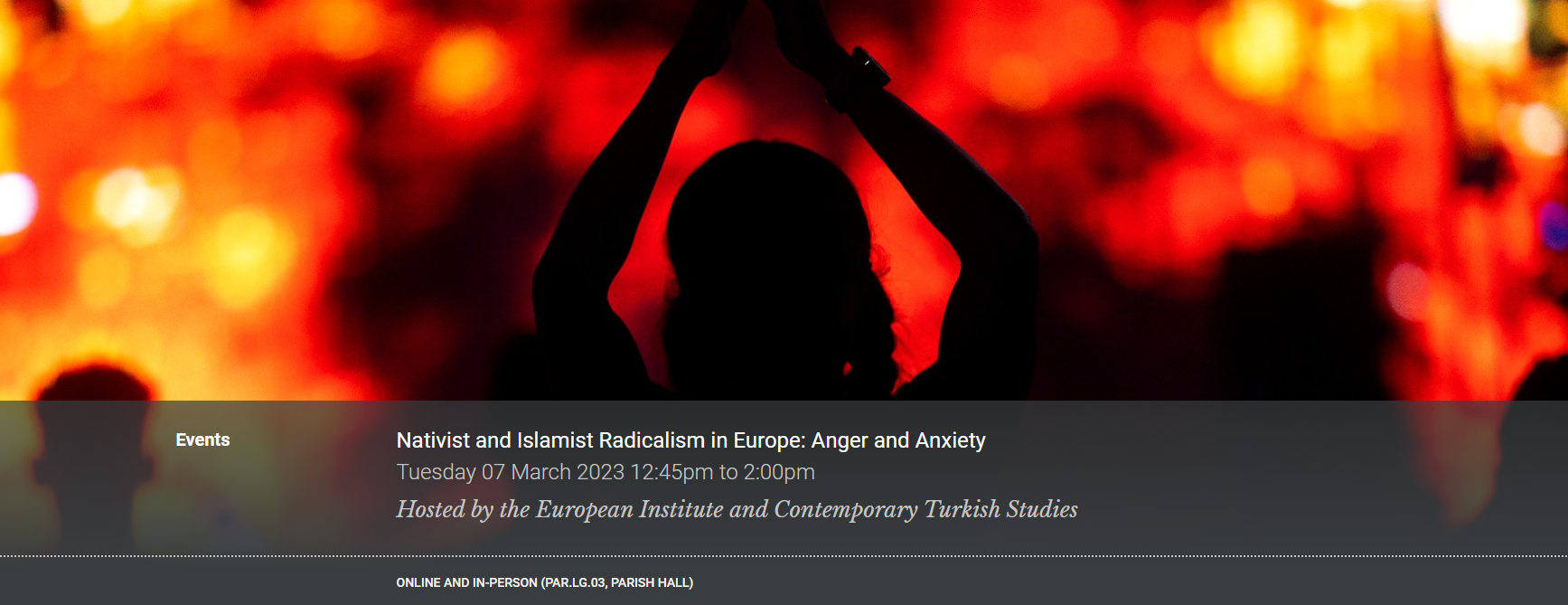Seminar
Nativist and Islamist Radicalism in Europe: Anger and Anxiety
7 March 2023 12:45pm to 2:00pm
Venue: Online and in-Person (PAR.LG.03, Parish Hall, LSE)
Hosted by the European Institute and Contemporary Turkish Studies.
This talk aims to challenge the scholarship that has so far studied European youth in ethno-culturally, and religio-politically divided separate clusters, such as “migrant-origin” and “native” youths.
Accordingly, it lays the groundwork by arguing that European youth respond differently to the challenges posed by contemporary flows of globalisation, such as deindustrialisation, structural exclusion, and socio-economic, political, spatial and psychological forms of deprivation and humiliation. Challenging the current uses of the term radicalism interchangeably with extremism, terrorism, fundamentalism, and violence, this study takes radicalism as a possible quest for the democratisation of democracies rather than a pathological issue. The novelty is to understand and explain the malaise of both ‘native’ and ‘immigrant origin’ youth simultaneously through a scientific method by de-culturalising and de-religionising what is socio-economic, political, and psychological in substance. So far, existing studies have focused on one or the other of these two phenomena, while this talk brings them together. Research findings are based on extensive fieldwork conducted in different European cities (n = 307 in-depth interviews with young European citizens in 18-30 age bracket in Belgium, France, Germany and the Netherlands) within the framework of an ongoing European Research Council Advanced Grant research.
Speaker:
Professor Ayhan Kaya is Professor of Politics and Jean Monnet Chair of European Politics of Interculturalism at the Department of International Relations, Istanbul Bilgi University; Director of the Jean Monnet Centre of Excellence; and a member of the Science Academy, Turkey. He is currently a European Research Council Advanced Grant holder (ERC AdG, 2019-2024). He previously held posts at the European University Institute, New York University, Florence, European University Viadrina and at Malmö University, Sweden. He is specialised in European identities, Euro-Turks, Circassian diaspora in Turkey, the construction and articulation of modern transnational identities, refugee studies in Turkey, conventional and non-conventional forms of political participation in Turkey, and the rise of populist movements in the EU. His latest manuscript is Populism and Heritage in Europe. Lost in Diversity and Unity (London: Routledge, 2020). His recently edited volume is Memory in European Populism (London: Routledge, 2019, with Chiara de Cesari).
Chair:
Dr. Katerina Dalacoura is Associate Professor in International Relations at the London School of Economics and Political Science. Dr Dalacoura’s work has centered on the intersection of Islamism and international human rights norms. Her latest research focuses on the role of culture and civilization in International Relations with special reference to Turkey and is funded by the Major Research Fellowship of the Leverhulme Trust. She is author of Islam, Liberalism and Human Rights: Implications for International Relations (I. B. Tauris, 2007) and Islamist Terrorism and Democracy in the Middle East (Cambridge University Press, 2011).
This event is open to LSE and BILGI staff and students, and the wider academic community. Please confirm your attendance to .


